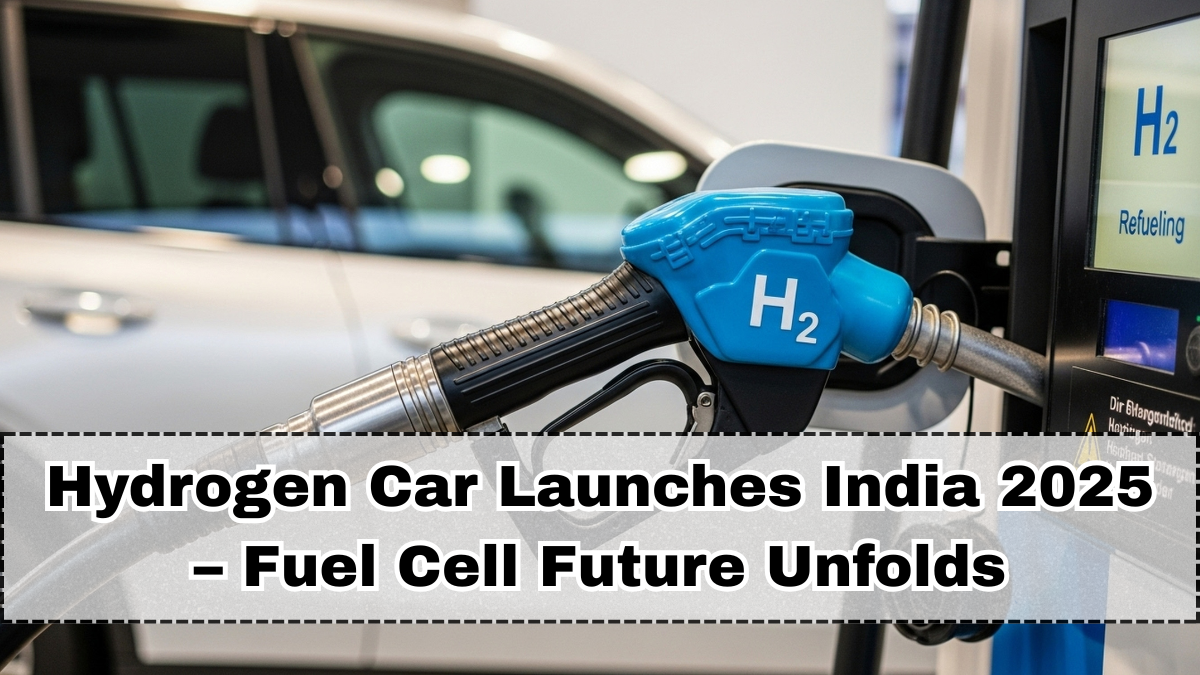India is entering a new era of clean mobility as Upcoming Hydrogen Car Launches India 2025 introduce fuel-cell electric vehicles (FCEVs) designed to deliver long range, zero emissions, and fast refuelling. With global interest rising and India’s Green Hydrogen Mission advancing rapidly, 2025 will be the breakthrough year when hydrogen-powered cars begin arriving on Indian roads. Unlike battery EVs, hydrogen cars produce only water vapour, making them one of the cleanest automotive technologies available today.
Hydrogen vehicles also solve key EV concerns such as long charging times and limited highway range. This makes them especially attractive for India’s long-distance commuters, corporate fleets, and government mobility programs. Automakers, energy companies, and policymakers are working together to build hydrogen refuelling infrastructure, starting with major metros and pilot corridors. As India accelerates its clean mobility roadmap, the hydrogen car India 2025 lineup will showcase advanced efficiency, premium interiors, and highly refined drivetrains.

Major Hydrogen Car Launches in India in 2025
1. Toyota Mirai – India’s First Major FCEV
Toyota will bring the globally successful Mirai to India as a pilot and limited commercial rollout.
Key Highlights:
• Range: 600+ km
• Emission: Only water vapour
• Drivetrain: Advanced fuel-cell stack
USP: India’s most proven hydrogen car
2. Hyundai Nexo – Premium Fuel-Cell SUV
Hyundai is expected to introduce the Nexo, a futuristic hydrogen SUV with strong global performance credentials.
Key Highlights:
• Range: 550–600 km
• Cabin: Premium tech-loaded interior
• Safety: ADAS Level 2 features
USP: Best premium hydrogen SUV option
3. Tata Hydrogen EV Concept – Indigenous Innovation
Tata Motors may begin trials of a hydrogen-powered version of its premium EV platforms, marking India’s first homegrown fuel-cell experiment.
Key Highlights:
• Modular fuel-cell architecture
• Long-range prototypes
• Connected car ecosystem
USP: India’s first indigenous hydrogen mobility program
4. Ashok Leyland Fuel-Cell MPV – For Fleet & Shuttle Use
Ashok Leyland is expected to introduce hydrogen MPVs designed for corporate and intercity shuttle mobility.
Key Highlights:
• Range: 400–450 km
• Purpose-built mobility
• Hydrogen tank safety enhancements
USP: Ideal for commercial and fleet hydrogen pilots
5. Maruti Suzuki Hydrogen Prototype – Urban Hydrogen Pilot
Maruti may test a hydrogen ICE (internal combustion engine) prototype as a stepping stone to future hydrogen mobility.
Key Highlights:
• Hydrogen-powered ICE
• Urban pilot use-case
• Low development cost
USP: India’s most accessible early hydrogen project
Why Hydrogen Cars Matter for India
Hydrogen vehicles offer advantages that directly address India’s mobility challenges. Their fast refuelling and long driving range make them ideal for high-mileage users, transport operators, and long-route driving.
Key benefits include:
• Zero tailpipe emissions
• Refuelling in under 5 minutes
• Long range better suited for highways
• Lighter powertrains compared to large EV batteries
• Ideal for commercial and government fleets
The fuel-cell vehicle India movement aligns with India’s clean energy goals and reduces dependence on imported oil.
India’s Hydrogen Infrastructure Push
India is rapidly creating the foundation for hydrogen mobility through multiple initiatives. The Green Hydrogen Mission aims to scale production and refuelling infrastructure using renewable energy.
Key developments include:
• Hydrogen refuelling stations in Delhi, Mumbai, Bengaluru
• Pilot corridors along highways
• Partnerships with Japanese and Korean automakers
• Investments in green hydrogen production
With government support and industrial collaboration, hydrogen uptake will expand faster than expected through the late 2020s.
Technology Behind Hydrogen Cars
Hydrogen cars use fuel-cell stacks to convert hydrogen into electricity, delivering smooth performance without the need for large batteries.
Core technologies featured in 2025 FCEVs include:
• High-efficiency fuel-cell stacks
• Onboard hydrogen tanks with multi-layer safety
• Regenerative braking
• Advanced cooling systems
• Software-managed energy flow
These innovations deliver strong energy efficiency, silent operation, and long-term reliability.
Challenges & Future Outlook
While hydrogen cars offer transformative potential, the main challenge is infrastructure. Refuelling stations are few, and early vehicles will be limited to pilot cities. However, as production scales and hydrogen becomes more affordable, India is expected to see rapid adoption from 2027 onwards.
2025 will be the foundation year, setting the stage for mass-market hydrogen vehicles in the following decade. With strong industry backing, hydrogen mobility will complement EVs and become a major clean transport solution.
FAQs
Are hydrogen cars safe?
Yes, hydrogen tanks undergo strict testing, and FCEVs meet global safety standards.
How long does it take to refuel a hydrogen car?
Typically 3–5 minutes, similar to petrol or diesel refuelling.
Are hydrogen cars expensive?
Early models may be premium-priced due to advanced technology.
Where will hydrogen cars launch first in India?
Initial launches will focus on Delhi, Mumbai, and Bengaluru.
Do hydrogen cars need charging?
No, they produce electricity onboard using hydrogen fuel cells.
Click here to know more.
